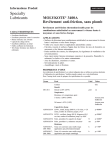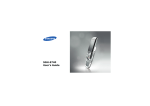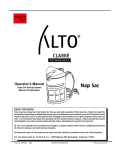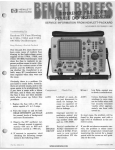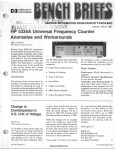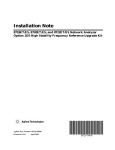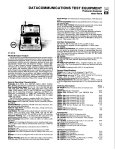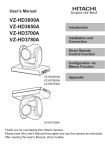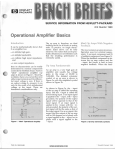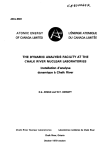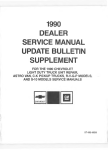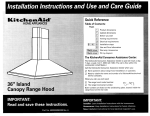Download Communications
Transcript
r 1 t i Communications Nancy Thomas, HP Stanford Park Diu. Ask a service engineer or technician what training they need and you’re likely to hear, “We need measurement and applications training.” If you think about it, the request makes sense. Understanding the environment that instruments operate in is a valuable addition to one’s troubleshooting tool kit. c Hewlett-Packard has developed an interactive training program aimed at new technical entrants in the field of digital microwave communications. If you or your group is involved in servicing microwave communications equipment, you’ll want to order a copy of the HP 11736A I-& Tutor, a digital microwave communications tool. 4 Structured Like a Laboratory Workbench -t 10; t ’ I-& Tutor is educational software r with a manual, and is designed to be used with the popular HP 9000 Model 216 or Model 236 computers. “I” and “ Q stand for the in-phase and quadrature phase signals of complex phase modulation used in today’s digital microwave communications systems. As shown in Figure 1, the program is structured to model a complete digital communications system, from the analog signal input through modulation, transmission, demodulation, and conversion back to analog. Figures 2-4 show working capabilities of the program. Using your “measuring probe pointer” and handy set of equipment displays, you can view Pub. NO. 5952-0122 mum t l HP Digital Microwave Communications Guide signals at various nodes of your system model in the time, frequency, and vector domains. Moves You Along the Learning Curve Faster You would probably have to read several books and articles to get the equivalent information presented in WWW.HPARCHIVE.COM one I-& Tutor package. There are no heavy theoretical discussions or difficult mathematics involved. You learn through a visual, intuitive approach. You look at actual signals at places you select in the systems chain. Then you can change the modulation format, signal-to-noise ratio, or filter alpha value, and compare the signals. A series of lab exercises guide you to @ Hewlett-Packard 1985 Real-world concerns - Multipath fade - High power amplifier nonlinearities - Advanced design mode System Block Diogrom: Probe Pointer: rn Experimental exercise - Probability of error [P(e)l vs. SNR - P(e) vs. filter bandwidth - Multipath and “ M curves - Distortion caused by HPA nonlinearities rn Additional information - Theory of I-& modulation/demodulation - Nyquist filters - Bandwidth System Signal Displays; Lab Notebook Pages: System Porameters and Key List Modulation Type‘OPSK Filter Alpha’ SNR. 4068 3 l-qIflIJ.1 L - FCC Figure 1. 1-0 Tutor system overview. Using Hewlett-Packard’s 1-0 Tutor is like walking through a complete digital microwave communications system with a handy set of test equipment and displays. explore the effects of degraded signalto-noise ratios, filter coefficient variations, and nonlinearities on system error rates. Even if you are only a casual computer user, you will quickly feel comfortable operating the program after followingthe step-by-step instructions in the manual. You can easily work I-& Tutor into your busy schedule. The entire program takes about eight hours and can be spread over as many sessions as you need. Ordering Information Subjects Covered Include: rn f-l The HP Model number of I-& Tutor is HP 11736A and the U.S. list price is $95.00. You will need an HP 9000 Model 216A or Model 236A computer with 640K bytes of memory, or the Model 236C with 896K bytes. For more information order flyer number 5954-6370 from your local HewlettPackard sales office listed in your telephone white pages. 0 Understanding fundamental concepts - Phase and magnitude - Practical digital modulation techniques - BPSK - QPSK - 16QAM - Offset QPSK - Offset 16QAM - Understanding the system block diagram /7 Q Clean and tight crossover points indicate errorfree transmission Q or I vs. time eye diagram / / \ Time Clock Instant Transition Period Vector Diagram I ~T * * I * I Constellation Diagram . ’3 Figure 2. This is a constellation display. You can examine the effects of system nonlinearities, such as amplitude compression distortion, on the I and 0 vector diagrams. 2 BENCH BRIEFS JUNE/AUGUST 1985 Figure 3. Learn by exploring. You are able to change how the system operates and immediately view the effects of those changes, such as degraded signal-to noise ratios causing a closing of the “eye.” WWW.HPARCHIVE.COM Offers MiI Iimeter wave Recalibration Ed Cantrell, HP Stanford Park Diu. Hewlett-Packard can now offer precision recalibration services for our new Q-band (33-50 GHz) and UBand (40-60 GHz) products, including: - Variable and fixed attenuators - Couplers - Detectors - calibration is directly traceable to the National Bureau of Standards at every standard frequency that NBS maintains. At the other frequencies, the calibration is indirectly traceable to physical NBS standards; that is, the reflection coefficient is indirectly Estimated Accuracy U-band (40 to 60 GHz) Cal-factor of power sensor 3.9% RSS 40 GHz (6.8% W.C. 40 GHz) 5.5% RSS 50 GHz (9.3% W.C. 50 GHz) Reflection coefficient 0.004 Attenuation 0.04 No. of Price Estimated Points (US. $) Accuracy Directivity of single coupler $1 50 + 0.017rD 51 $100 0.004 + 0.03/10 dB 51 Limited by measuring system effective directivity of 46 dB 51 $150 0.05 Per attn. setting $300 No. of Price Points (US.$) Not currently available 18 - Isolators Service notes from HP relating to personal safety and possible equipment damage are of vital importance to our customers. To make you more aware of these important notes, they are printed on paper with a red border, and the service suffix. In note number has a “-S’ order to make you immediately aware of any potential safety problems, we are highlighting safetyrelated service notes here with a brief description of each problem. Also, in order to draw your attention to safety-related service notes on the service note order form at the back of Bench Briefs, each appropriate number is highlighted by being printed in color. The following table provides a summary of HP’s current millimeter wave calibration capabilites. 0 Q-band (33 to 50 GHz) Sliding shorts You will receive a full report of the calibration parameters as a function of frequency, including uncertainties, at every 1 GHz. HP millimeter wave traceable to NBS through the diILLGL1sions of a sliding load and offset short. + 0.02rD 51 $115 + 0.03/10 dB 51 $175 Per attn. setting 51 $350 Limited by measuring system effective directivity of 46 dB Note: Calibration factor, attenuation a n d directivity calibration reports also include reflection coefficient. Oscilloscopes -A mechanical hazard may exist on these oscilloscopes. As you are carrying the unit, the strap handle may break allowing the instrument to fall on your foot. Refer to the following photographs to see if your oscilloscope requires modification. If your oscilloscope requires the new large-headed handle retaining screws, you can order the following kit from Hewlett-Packard free of charge. Note that the kit is available at no charge until January 1, 1986. Address your request for the kit to the address listed below. Please indicate the instrument model and serial number for all instruments requiring this safety modification. WWW.HPARCHIVE.COM Old handle fastener screw New handle fastener screw HP P/N 00182-22401 Order HP Part No. 00812-69505from HEWLETT-PACKARD CO. P.O. Box 2197 Colorado Springs, CO 80901 Attn. Product Assurance Mgr. JUNE/AUGUST 1985 0 BENCH BRIEFS 3 r. Using Fiber Optics to Transmit a Frequency Standard I qL Brett Frymire, NP OptoCommunications Diu. Are you considering installing a frequency standard to all your repair benches? You may want to think about using fiber optic cable in place of coax. Some of fiber optic's advantages are: Transmitter HFBR-1402/4 The cable is smaller and easier to handle than coax. *." Fiber optic cable HFBR-3000 Does not g e n e r a t e electrical interference. rn SMA connector Receiver HFBR-2404 I t is not affected by electrical interference. Data security (cannot be easily monitored). Depending on the specific frequency (for example, 10 MHz), fiber and coax have similar electrical performance. However, at higher frequencies, specifically 100 MHz, the fiber system can transmit data over longer distances than can be done with a coax system. Another factor that affects performance is the environment in which the system is located. An electrically noisy environment affects coax but not fiber. This is the proposed system that uses fiber optic links. (A fiber optic link consists of a transmitter, the fiber cable, and the receiver, all of which replaces the wire cable.) Again, there are many different and possible variations of the same system. For example, if the distance between the four benches and their corresponding distribution amplifier is too far ( >5 meters), another entire fiber optic link could be used to tie these benches to their distribution amplifier. In any case, this article describes the fiber optic link shown in Figure 2. ,? The criteria for our system is that it must be able to operate from 1 MHz I This article will describe using fiber optics to transmit frequency standards of 1 MHz, 5 MHz, and 10 MHz with the standard HP components shown i n the photograph. If your system matches the example used in this article, all that is required is to build the circuits described and then install the system. If you want to make changes, the formulas, diagrams and schematics are supplied that will allow you to build a custom system for your office. Before describing the fiber optic link, let's look at a typical block diagram of a system that uses coax (see Figure 1).Even if your system requirements are slightly different, the basic idea is the same. Now look at Figure 2. 4 BENCH BRIEFS JUNE/AUGUST 1985 7 Figure 1. Block diagram of typical frequency standard distribution scheme using coax. WWW.HPARCHIVE.COM and carry the signal for tre distance (1meter to 1 ). The Hewlett-Packard ;s that meet these requireinexpensive and easy to d are listed below: 5 r 1 FREQUENCY STANDARD DISTRIBUTION AMPLIFIER I 1 I I itter-HFBR-1402/4 m L‘ Receiver-HFBR-2404 RECEIVER Cable-HFBR-3000 b BENCH As mentioned before, the proposed system consists of three parts; the transmitter, which is a light emitting diode (LED) with support circuitry, the fiber cable, which propagates the light from the transmitter t o the receiver, and the receiver, which is a light sensitive photodiode with support circuitry. Transmitter !? r . . r BENCH I” J ” / / BENCH 3 I. 4. The first part of the link, the transmitter, consists of a drive circuit that current modulates the LED. The circuit shown in Figure 3 utilizes independent resistors (Rm and Rq) to select the drive current for modulation (Ifm) and the quiescent current for the dc current level of the LED (Ifq). Note that the drive current sets the amount of optical power that the diode emits and that the LED should operate from maximum peak current to just above extinction (zero optical power). Quiescent current refers to the dc operating point that biases the LED in the center of its operating range (just like a transistor’s Q point). Note the network of the three diodes (CR1-3)and the 2N2905 (Ql) transistor. This network sets the voltage at the LED to the center of the range between Vcc and ground. This is to avoid any clipping of the signal in the LH0002. Modify the circuit as shown in Figure 4 and the same signal can be transmitted down two fibers instead of one. Now, the two currents, the Ifq and Ifm, must be calculated. Referring to the values shown in Table 1,we see that the maximum peak operating current for the LED is 70 mA. The recommended operating value that FIBER OPTIC RECEIVER BENCH BENCH BENCH Figure 2. Block diagram of same frequency standard distribution scheme as shown in Figure 1 only using fiber optics. +8.5V L--+ +8.5V Figure 3. Fiber optic transmitter. WWW.HPARCHIVE.COM JUNE/AUGUST 1985 BENCH BRIEFS 5 Table 1. HFBR-1402/1404 Transmitter Absolute Maximum Ratings ~~ Parameter Symbol Storage Temperature Operating Temperature Ts -55 +85 "C TA - 40 +85 "C Lead Temp. Soldering Cycle Time Forward Input Current Min. Max. Unit +260 "C 10 sec Peak lFPK 70 mA Avg. ~FAV 70 mA Reverse Input Voltage VBR 1.8 v we use, will be 60 mA. To allow for full excursion of the drive current, the quiescent point is set a t the midpoint, 30 mA. With the Ifq determined at 30 mA, calculate Rq with the formula shown in Table 2a. For our circuit, the value of Rq is [8.5v2v-2.4~]/30mA = -150 ohms. With this value of Rq the modulation current (controlled by Rm) can be set with the formula shown in Table 2b. Set the drive current for a swing of 28 mA. This provides a guard band of 2 mA (30 mA-28 mA) to avoid clipping of the signal that would occur if the LED turned completely off. Substitute the numbers for the variables, Rm = 1 5 / 2 8 mA = -56 ohms. Depending on the tolerance of the resistors and the devices involved, the guard band can be wider or narrower. These values of Rq (150 ohms) and Rm (56 ohms) are typical values and can be used for this circuit. Table 2. Formulas (b) Rm = Vp/lfm Vp = V,, p-pI2 Figure 4. Alternate fiber optic transmitter with two optical ports. For this article, we used 100/140 pm graded index fiber cable (HFBR3000). HFBR-3000 can be ordered in the required lengths with the connectors already installed or you can make up your own cables using a connector kit and a spool of cable. Because of the complexity of installing connectors (18 steps are involved that require special tools) and if only a few cables are needed, it will be less expensive to order pre-made cables in the desired lengths. Table 3. HFBR-2404 Receiver Absolute Maximum Ratings ~~ ~ Parameter Symbol Min. Max. Unit Storage Temperature T, -55 +85 "C Operating Temperature TA -40 +85 "C Lead Temp. Soldering Cycle Time Signal Pin Voltage Supply Voltage +260 "C 10 sec VSIGNAL -0.5 Vcc -0.5 1 V 7.0 V Receiver Fiber Cable The second part of the link, the fiber cable, needs to be made to the lengths needed. There are several types of cable available with varing fiber diameter cores. (For more information on fiber and connectors refer to Tech Brief 101 and 102 available from Hewlett-Packard as HP publication number 5954-1004 and 5954-1011.) 6 BENCH BRIEFS JUNE/AUGUST 1985 The final part of the link, is the receiver as shown in Figure 5. The receiver uses a video amplifier with automatic gain control (AGC) so that fiber distances of 1 metre t o 1.5 kilometres can be used without adjusting the transmitter or the receiver circuit. The HFBR-2404 receiver (a partial datasheet of the HFBR-2404 is shown in Table 3) converts the WWW.HPARCHIVE.COM optical signal to a voltage, which is bufferred with an internal preamplifier to the video amplifer (LM733), which amplifies the signal to the desired levels. Note that the LM733 has complimentary outputs. Add another emitter follower stage and two outputs can be used from one receiver circuit. The gain of LM733 is controlled by an AGC loop consisting of a peak detector, an OP Amp (LF3511, 1 Figure 5. Fiber optic receiver. and the FET, 2N4416, which will maintain a constant output within the range of the AGC loop. This constant output level depends on the reference level established by the divider network of R7 and R8.Different levels of the output signal would require this network to be adjusted. "he last part of the circuit is the emitter follower, 2N5179, which allows the circuit to drive into a 50 ohm load. Receiver Parts List Transmitter Parts List Reference Designators Distributing frequency standards is only one of the many uses of fiber optics. This particular circuit, with some modifications, also work for base-band video applications. In addition to these analog applications, there are still many digital applications, which include local area networks, PBXs and many more.0 JDEC # HP # LH0002 LM741 2N2905 FD777 HFBR-1402 1820-0224 1826-0271 1853-0314 1901 -01 79 HFBR-1402 U1 U2 Q1 CR1 C1-3 c4 .1 ufd 4.7ufd 0160-0576 0180-2683 R1 R2, 3 R4 51 ohms 1 Kohm 3.9 Kohm 0683-5105 0683-1025 0683-3925 Rm, Rq select components Active parts u1 u2 Q1 CR1-3 CR4 JDEC # HP # LM733 LF351 2N5179 1 N4150 HFBR-2404 1820-0064 1820-0667 1854-0345 1901-1098 HFBR-2404 C1, 3-10 C2 .1 ufd 1ufd 01 60-0176 0160-0127 R1 R2, 3 R4 R5, 6 R7 R8 R9 R10 100 ohms 2.2 Kohms 22 Kohms 1 Mohms 18 Kohms 3.3 Kohms 1 Kohms 10 Kohms 0683-1015 0683-2225 0683-2235 0683-1055 0683-1835 0683-3325 0683-1025 0683-1035 Active Parts Passive Parts Passive Parts WWW.HPARCHIVE.COM Brett Frymire, who joined Hewlett-Packard in February 1981, works as an Application Technician at HP Opto-Communications Division. His primary duties consist of breadboarding and testing of circuits that involve fiber optics and optocouplers. Previous to his present position, Brett worked at Instrument Suppott Division repairing surveying gear, counters and various other equipment. JUNE/AUGUST 1985 BENCH BRIEFS 7 I? AS we p r e v ~ o u s ~SyL ~ L ~111 U L I I ~ ~J~IIUary-February issue of Bench Briefs, Hewlett-Packard is designing new products with full metrics. As those products are introduced to the market, and older products are retired, the line will naturally become more metric. Starting early this year, HP began shipping instruments that use the socalled System I1 cabinet configuration with metric-threaded fasteners in the frame parts. Brackets and cabinetjoining hardware will attach with metric screws although the internal structure will remain standard inchthreaded fasteners (in the older instruments). Instruments with these mixed inch‘threadedlmetric-threadedconfigurations will be identified with labels inside each top and bottom cover. There should also be a notification label attached to the rear panel of each instrument. And as the updates become available, the operating and service manual will carry a notification addendum sheet. The frame parts themselves will have either an “M’ designator or the word “metric” cast into a visible spot for identification as shown in the accompanying photographs. These photographs show how you can identify the new cabinets that now use the metric fasteners for attaching cabinet accessories. To prevent damage and to preserve the structural integrity of the cabinets, it is vitally important to use the proper fasteners. As an aid to our customers, HP has modified most of the cabinet accessory kits t o include both the metricthreaded and inch-threaded fasteners. These cabinet accessory kits are shown on pages 682-685 of the 1985 HP Catalog (HP No. 5954-0168). The accompanying list shows the new kit part numbers that contain both inchthreaded and metric-threaded fasteners. 0 8 BENCH BRIEFS JUNE/AUGUST 1985 Front bezel casting has metric mark under trim strip on the right corner. Rear bezel casting has metric mark alongside the top cover-attaching screw. WWW.HPARCHIVE.COM Sidestrut castings have small M mark embossed in cast dimple on one end. New Kit Number Old Kit Number (contains both (now metric and inch obsoleted) fasteners) * 5061-0057 0058 0060 0061 0066 0067 0071 0072 0073 0074 0075 0076 0077 0078 0079 0080 0081 0082 0083 0084 0085 0086 0087 0088 0089 0090 0091 0092 0093 0094 0095 0096 0097 5061-9657 9658 9660 9661 9666 9667 9671 9672 9673 9674 9675 9676 9677 9678 9679 9680 9681 9682 9683 9684 9685 9686 9687 9688 9689 9690 9691 9692 9693 9694 9695 9696 9697 Description Rack Adapter Rack Adapter Rack Adapter Rack Adapter Rack Adapter Rack Adapter Rack Adapter Rack Adapter Rack Adapter Rack Flange Rack FlangeiHandles Rack Flange Rack Flange Rack Flange Rack Flange Rack Flange Rack Flange Rack FlangeiHandles Rack FlangeiHandles Rack FlangeiHandles Rack FlangeiHandles Rack FlangeiHandles Rack FlangeiHandles Handles Handles Handles Handles Handles Handles Lock Link Kit Cord Wrap Feet Support Shelf Support Shelf New Kit Number Old Kit Number (contains both (now metric and inch obsoleted) fasteners) 0098 0099 2001 2002 2003 2009 2069 2070 2071 2072 2073 2074 2075 9698 9699 9701 9702 9703 9709 9769 9770 9771 9772 9773 9774 9775 1494-0023 0042 1494-0061 0064 Support Shelf Lock-Foot Kit Bail Handle Bail Handle Bail Handle Rear Standoff Feet Rack FlangesiPrevious Handles Rack FlangesiPrevious Handles Rack FlangesiPrevious Handles Rack FlangesiPrevious Handles Rack FlangesiPrevious Handles Rack FlangesiPrevious Handles Rack FlangesiPrevious Handles Rack End Brackets Rack End Brackets These following slide mount kits will maintain both an inch-threaded version and a metric-threaded version because the fastening screws themselves require that the slide mount sheet metal be countersunk differently for the two fasteners. Old Kit Number (inch fasteners) New Kit Number (metric fasteners) Description 1494-0016 0017 0018 0025 0026 1494-0058 0059 0060 0062 0063 Slide Kit Slide Kit Slide Kit Slide Kit Slide Kit They’re free! Meed Any Service Notes? Description Here’s the latest listing of service notes. They recommend modifications to Hewlett-Packard instrum e n t s t o increase r e l i a b i l i t y , improve performance, o r extend their usefulness. Use the order form at the rear of Bench Briefs to order, free of charge, individual service notes documenting several instruments. If you would like to purchase large quantities of service notes covering a wide range of instruments, or if you desire a complete history of all service notes documenting a l l changes to your instruments, Hewlett-Packard offers a microfiche library for a modest, one time charge. There is also a microfiche subscription service available that automatically updates the library on a quarterly schedule. The part numbers for the service note microfiche library and subscription service are: LibrarySubscription service- 5951-6511 5951-6517 Contact your local HP Sales Office for ordering information. HP 182A/C/T OSCILLOSCOPE 182A-5-S.All serials. Possible hazard due to instrument handle breakage. 182C-5-5. All serials. Possible hazard due to instrument handle breakage. 182T-4-S. Serials 2010A011380 and below. Possible hazard due to instrument handle breakage. HP 334A DISTORTION ANALYZER HP 1345A OPTION 704 DIGITAL DISPLAY WITH MEMORY 1345A704-16. Serials 2501A and below. Modification to prevent erratic/intermittent display. HP 3776A/B PCM TERMINAL TEST SET 1631A/D-lA. 1631A serials 2509A and below. 1631D serials 2510A and below. Recommended PROM replacement to correct firmware. HP 1727A OSCILLOSCOPE HP 3779AlB PRIMARY MULTIPLEX ANALYZER HP 1630A/D LOGIC ANALYZER 1630A/D-6. 1630A serials prefix 2511A, 251 1G and 2507J. 1630D serials 2511A, 2512G and 2507J. Recommended PROM replacement to correct firmware. HP 1631A/D LOGIC ANALYZER 1727A-3. Serials 2452A01225 and below. Potential power transformer failure due to capacitor shorting. HP 3061A/3062A CIRCUIT TEST SYSTEM 3061A/3062A-11. All serials. Product support package descriptions. 3061A/3062A-12. All serials. Configuration/confirrnation/diagnosticssoftware. HP 3065 BOARD TEST SYSTEM 3065-20. All serials. Repair of the external vacuum module part number 03085-80602. 3065-26. All serials. Test and modification to solve intermittant digital cal failures. HP 3325A SYNTHESIZER/FUNCTION GENERATOR HP 3336A/B/C SYNTHESIZER/LEVEL GENERATOR 3336AIBIC-15A 3336Aserials 1930A01115andbelow 33366 serials 1931A02240 and below 3336C serials 1932A00850 and below 30 MHz crystal change to prevent intermittent oscillator failures HP 1200A OSCILLOSCOPE HP 1201A OSCILLOSCOPE HP 1202A OSCILLOSCOPE 1202A-4-5. All serials. Possible hazard due to instrument handle breakage. HP 1205A OSCILLOSCOPE 1205A-5-S. All serials. Possible hazard due to instrument handle breakage. HP 1206A OSCILLOSCOPE 1206A-4-S. All serials. Possible hazard due to instrument handle breakage. HP 1207A OSCILLOSCOPE 1207A-7-S. All serials. Possible hazard due to instrument handle breakage. HP 1208A DISPLAY/VARIABLE PERSISTANCE SCOPE 1208A-144. All serials. Possible hazard due to instrument handle breakage. HP 1215A OSCILLOSCOPE 1215A-3-S. All serials. Possible hazard due to instrument handle breakage. HP 1217A OSCILLOSCOPE 1217A-4-S. All serials. Possible hazard due to instrument handle breakage. 10 BENCH BRIEFS JUNE/AUGUST 1985 lvlcILllr 3776A-21A. All serials. 3776 test programs data cartridge (HP part number 03776-10001) rnodifications-update to Rev C. 3776A-22. Serials 2444U00292 and below. Firmware revision to change generated idle code. 37766-21A. All serials. 3776 test programs data cartridge (HP part number 03776-10001) modifications-update to Rev C. 37766-22. Serials 24371100742 and below. Modification to prevent measurement inaccuracies in timeslot 24. 37766-23. Serials 2437U00642 to 00801. Preferred replacement for PROMS A14U13 and A14U23. HP 355C/D VHF ATTENUATOR 1201A-10-S. All serials. Possible hazard due to instrument handle breakage. I.VII HP 1345A DIGITAL DISPLAY 3325A-16A. Serials 1748A16400 and below. 30 MHz crystal change to prevent intermittent oscillator failures. 1200A-8-S. All serials. Possible hazard due to instrument handle breakage. 3764A-5A. Serials 24191100257 and LU,.. memory protection. 1345A-3A. Serials 2515A and below. Model changes and compatibility. 334-106. Serials 1145A05870 and below. Recommended replacements for the A4 R.F. Detector assembly. 355C-1. Serials 1203A36850 and below. New attenuation dial. 355D-1. Serials 1204A39325 and below. New attenuation dial. HP 3764A DIGITAL TRAN ANALYZER HP 3455A DIGITAL VOLTMETER 3455A-24 Senals 2519 and above and 1622 and below System II cabinets inchlmetric conversion HP 3456A DIGITAL VOLTMETER 3456A-20 Serials 2512 and above and 2201 and below System II cabinets inchlmetric conversion HP 3478A DIGITAL MULTIMETER 3478A-5 Serials 2520 and above and 2301 and below System II cabinets inchlmetric conversion HP 3497A DATA ACQUISITION AND CONTROL UNIT 3497A-19. All serials. 9825A/B CARDVER program error. 3497A-20. Serials 2222A08697 through 2448A16174. Modification to replace missing decade address change trace. 3497A-22. All serials. Getting DC1 handshaking to work for the RS232 option when a 44420A internal DVM is not present. HP 3708A NOISE AND INTERFERENCE TEST SET 3708A-1. Serials 24141100127 and below. Preferred replacement for A201C1 capacitor. HP 3746A SELECTIVE LEVEL MEASURING SET 3746A-13A. Serials2314U00352 and below. Retrofitting high level search (hot tone) facility. 3746A-15A. Serials 241OU00602 and below. Inspection for short circuit between motherboard and casting. WWW.HPARCHIVE.COM 3779A-39. All serials. Instructions for retrofitting the 3779C/D A8 assembly to the 3779A. 37796-42. All serials. Instructions for retrofitting the 3779C/D A8 assembly to the 37796. HP 3779C/D PRIMARY MULTIPLEX ANALYZER 3779'2-22A. Serials 00458 and below. Preferred replacement for assemblies A23, A24, A25 and A26. 3779D-26A. Serials 00438 and below. Preferred replacement for assemblies A23, A24, A25 and A26. HP 3780A PATTERN GENERATOR/ERROR DETECTOR 3780A-176. All serials. Retrofit kit instructions for option 100. 3780A-18A. Serials 1804U00523 and below. Retrofit kit to incorporate equaliser and attenuator in existing option 100. HP 3785A/B JITTER GENERATOR 81 RECEIVER 3785A-15. Serials 2409U and below. Recornmended replacement for the rotory pulse generator. 37856-14. Serials 2408U and below. Recommended replacement for the rotory pulse generator. HP 4935A TRANSMISSION IMPAIRMENT TEST SET 4935A-12. All serials (with options 001 and 003). Modification to prevent fuse blowing. HP 4951A PROTOCOL ANALYZER 4951 A-EA. Serials 2443A2722 and below. Improved carrying handle. 4951A-11. Serials 2508A to 2508A03900 and all HP 4951 A's that have been updated to Software Rev. 2.0.Notification of Software Revision 2.1. 4951A-12. Serials 2508A03891 and below. Modification to correct intermittent "SERVO ERROR' message. 4951A-13. Serials 2508A and below. Modification to prevent BERT errors. HP 4953A PROTOCOL ANALYZER 4953A-1 A. Serials prior to 2441A00326. Modification to prevent breaking the. handle mounting rails. 4953A-5. Serials prior to 2516A002576. AC line switch replacement. HP 4955A PROTOCOL ANALYZER 4955A-9. Serials prior to 2507A. Notification of firmware revision 2.0 upgrade. 4955A-10. Serials 2404A and below. Preferred replacement for the HP P/N 04955-62617 trap machine kit. HP 5180A WAVEFORM RECORDER 5180A-20. Serials 2448AO1010 and below. Modification to improve histogram test results. 5180A-21. Serials 2436A00990 and below with the following exceptions: 2324A00700, 2404A00860, 2404A00861, 2404A00865, 2404A00872, 2404A00875, 2404A00877, 2404A00878, 2404A00911, 2404A00957, 2404A00975. Modification to eliminate mistrigger. HP 5182A WAVEFORM RECORDER/GENERATOR 7 5182A-1. Serials 2448A00315 and below. Modification to fix DMA problems with "auto stop" and chop mode data records. 5182A-2. Serials 2442A00300 and below. Modification to improve histogram test results. HP 5340A MICROWAVE FREQUENCY COUNTER 5340A-21A. All serials. Option 006 microwave limiter retrofit. HP 5342A MICROWAVE FREQUENCY COUNTER 5342A-42A. Serials 2440A09236 and below. Modification to prevent high frequency miscount. HP 5343A MICROWAVE FREQUENCY COUNTER 534A-20A. Serials 2424A01674 and below. Modification to prevent high frequency miscount. HP 5345A ELECTRONIC COUNTER /7 5345A-28. Serials 2420A10310 and below. Instructions to update the front end for an HP 5345A option 012. 5345A-29. Serials 2420A10310 and below. Instructions to update the front end for either a standard HP 5345A or an HP 5345A option 011 (original version front end). 5345A-30. Serials 2420A10310 and below. Instructions to retrofit a standard HP 5345A to option 012 and to update the front end circuitry. 5345A-31. Serials 2420 and below. Modification for option 011 computer dump mode compatibility with Series 200 computers. 5345A-32. Serials 2420 and below. Modification for option 012 computer dump mode compatibility with Series 200 computers. 5345A-33. All serials. Modification to alleviate crosstalk from channel A to channel 8. 5345A-34. All serials. Use a 10 MHz filter to prevent 5345A miScount due to synthesized generators. 5345A-35. All serials. How to prevent 5345A miscounts in TI and ratio modes. 5345A-36. Serials 2420A10311 and above. Incorrect artwork on Revision A of A20 filter assembly (HP P/N 05345-60130). HP 5510A AUTOMATIC COMPENSATOR 5510A-1. First serial number 2520A03686. A9 control board assembly IC change. HP 5517A/18A LASER HEADS 5517A/18A-1. All serials. Repair of sampler assembly. 5517A/18A-2. Serials 2502A01011 and above. Notice of change from 5518A laser tube to 5517A laser tube in 5518A laser heads. HP 6942A MULTIPROGRAMMER 6942A-11. Serials 2433A and below. Modificationt to guarantee proper operation of the clock generator circuit. HP 8112A PULSE GENERATOR 50 MHz 10752A/B/C-1. All prefix serials. Recommended replacements. HP 11729A/B LOW NOISE DOWN CONVERTER 8112A-2. Serials 2343G02255 and below. Modification to prevent blown fuses in the output amplifier supplies. 11729A/B-1,All series. Recommended IF amplifier assembly replacement. HP 8116A PULSE/FUNCTION GENERATOR 50 MHz HP 14751A CAT PROGRAMMING PACKAGE 81 16A-3. Serials 2334603645 and below and 2334A01585 and below. Modification to prevent blown fuses in the output amplifier supplies. 8116A-4. Serials 2124G00194, 189, 180, 175 and below. Piggy-back board modification for additional shaper stage adjustments. 14751A-1. All serials. Corrections to the software code in the 69791A Memory Card Test routine. HP 37212A MODEM 37212A-1. All serials. Modification to prevent invalid remote digital loopback initiation. HP 8170A LOGIC PATTERN GENERATOR HP 54200A/D DIGITIZING OSCILLOSCOPE 8170A-5. Serials 2036G01395 and below. Improved temperature compensation of A7 U6. 54200A/D-l,54200A/D serials 2445A only. Recommended PROM replacementto correct firmware. HP 8340A SYNTHESIZED SWEEPER HP 59401A BUS SYSTEM ANALYZER 8340A-5. Serials 2409A and below. Modifications to incorporate A14 power amplifier replacement kit. 59401A-1. Serials 2512 and above, and serials 1914 and below. System II cabinets inchlmetric conversion. HP 8447C/D/E/F RF AMPLIFIER 8447C-1A. Serials 1937A and below. Modification kit for replacement amplifier. 8447D-4/8447E-4/8447F-4. All serials. Prevention of amplifier damage due to electrostatic discharge. HP 8555A SPECTRUM ANALYZER 8555A-6C. All serials. Instructionsfor changing A3 YIG oscillator assembly. HP 64000 LOGIC DEVELOPMENT SYSTEM 64000-01.Service note index. 64100A DEVELOPMENT STATION 64100A-15. Various serial numbers. Misloadedjumper causes PROM programmer softkey to not appear. HP 64110A DEVELOPMENT STATION 6411OA-9. Serial numbers listed in body of the note. Display intensity problem fixed by resistor change. HP 8557A SPECTRUM ANALYZER 8557A-8A. Serials 2106A and below. Front panel retrofit kit. 8557A-13. Serials 2229A and below. Recommended first LO and frequency control assembly replacement kit. HP 85588 SPECTRUM ANALYZER 85588-33. Serials 2436A10965 and below. Video filter potentiometer replacement. HP 8565A SPECTRUM ANALYZER 8565A-21. All serials. A16 sweep generator board replacement. HP 8566A/B SPECTRUM ANALYZER 85668-1. Serials 2503A and below. Rack mounting with slides (option 010) English System II cabinet parts. 85668-2. Serials 2516A and above. Instructions for rack mounting slides (option 010) on metric System II cabinets. HP 6212A DC POWER SUPPLY HP 8568A/B SPECTRUM ANALYZER 6212A-3. All serials. Recommended bottom cover replacement. 6214A-3. Recommended bottom cover replacement. 85688-1. Serials 2431A and below. Instructions for rack mounting slides (option 010) on English System II cabinets. 85688-2. Serials 2517A and above. Instructions for mounting slides (option 010) on metric System II cabinets. HP 6216A DC POWER SUPPLY HP 85698 SPECTRUM ANALYZERS 6216A-3. All serials. Recommended bottom cover replacement. 85698-9. All serials. A1 6 sweep generator board replacement. HP 6214A DC POWER SUPPLY HP 10752A/B/C MATERIAL TEMPERATURE SENSOR HP 64224A 80186 EMULATOR SUBSYSTEM 64224A-1. 80186 emulator pod board repair number 2503A-00410 and below, and 2503A-00426 thru 00431. Emulator POD RFI end shield change. HP 64225A 80188 EMULATOR SUBSYSTEM 64225A-1,80188 emulator pod board repair number 2448A-00130 and below, and 2448A-00133, 134. Emulator POD RFI end shield change. HP 64249A 68010 EMULATOR SUBSYSTEM 64249A-1,68010 emulator pod board repair number 2412A-00250 and below. Emulator POD RFI end shield change. HP 64292A NSC8OO EMULATOR SUBSYSTEM 64292A-2. NSC800 emulator pod board repair number 2435A-00260 and below. Emulator POD RFI end shield change. HP 69759A 500 kHz A/D CARD 69759A-1. Serials 2409A and below. Modification to prevent system hang-up when internally triggering the 69759A 110 card. HP 69791A HIGH SPEED MEMORY CARD 69791A-2. All serials. Specifications for the 69791A memory card's +5 volt supply current. HP 6218A DC POWER SUPPLY HP 86848 SIGNAL GENERATOR HP 70001A MAINFRAME 621 EA-3. All serials. Recommended bottom cover replacement. 86846-3. All serials. Power amplifier oscillation troubleshooting hint. 70001-1. All serials. HP 70001A mainframeto System II cabinet interlock kit (HP P/N 5061-9061). WWW.HPARCHIVE.COM JUNElAUGUST 1985 BENCH BRIEFS 11 ' For European customers (ONLY) Name Hewlett-Packard Nederland BV Central Mailing Dept. P.O. Box 529 1180 AM Amstelveen The Netherlands Firm Address City State Zip 0 37766-23 0 3779A-39 0 37796-42 0 3779C-22A 0 3779D-26A 0 5182A-1 0 5182A-2 0 5340A-21A 0 5342A-42A 0 5343A-20A 0 6218A-3 0 6942A-11 0 8112A-2 0 8116A-3 0 8116A-4 0 85696-9 0 86846-3 0 10752A/B/C-l 0 11729A/B-1 0 14751A-1 0 3780A-176 0 3780A-18A 0 3785A-15 0 37856-14 0 4935A-12 0 5345A-28 0 5345A-29 0 5345A-30 0 8170A-5 0 8340A-5 0 8447C-1A 0 8447D-4 0 37212A-1 0 54200AlD-1 0 59401A-1 0 64000-01 0 64100A-15 0 4951A-8A 0 4951A-11 0 4951A-12 0 4951A-13 0 4953A-1A 0 5345A-33 0 5345A-34 0 5345A-35 0 5345A-36 0 551OA-1 0 4953A-5 0 4955A-9 0 4955A-10 0 5180A-20 0 5180A-21 0 5517A/18A-l 0 5517An8A-2 0 6212A-3 0 6214A-3 0 6216A-3 5345A-31 0 5345A-32 8447E-4 8447F-4 0 8555A-6C [7 8557A-8A 0 855749-13 0 85586-33 0 8565A-21 0 85666-1 0 85666-2 0 85686-1 0 85686-2 0 64110A-9 0 64224A-1 0 64225A-1 0 64249A-1 0 64292A-2 0 69759A-1 0 69791A-2 0 70001-1 Please photocopy this order form 11 you do not want to cut off the page Bulk Rate U.S.Postage f All rights reserved Permission to reprint Bench Briets granted upon written request to the Editor 12 BENCH BRIEFS JUNE/AUGUST 1985 WWW.HPARCHIVE.COM Printed in U S A .













